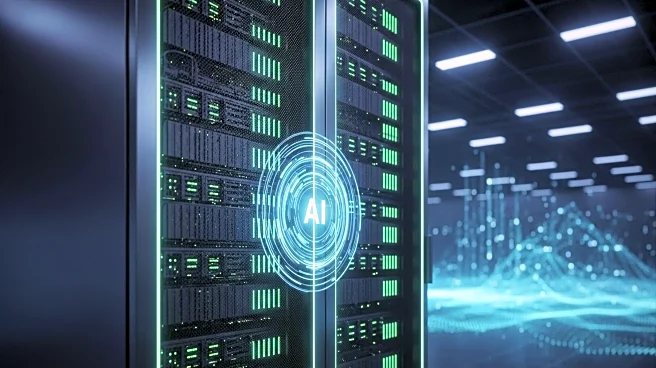What's Happening?
Nvidia and OpenAI have announced a strategic partnership to develop a massive AI infrastructure project, described as the largest in history. This collaboration will involve deploying at least 10 gigawatts of Nvidia systems to support OpenAI's next-generation AI infrastructure, including the Nvidia Vera Rubin platform. Nvidia plans to invest up to $100 billion in OpenAI as each gigawatt is deployed. The initiative aims to scale OpenAI's compute capabilities with multi-gigawatt data centers powered by millions of Nvidia GPUs. This infrastructure is intended to meet the training and inference demands of advanced AI models, supporting OpenAI's growth and development of new AI capabilities.
Why It's Important?
The partnership between Nvidia and OpenAI is significant for the AI industry, as it represents a major investment in AI infrastructure that could accelerate the development and deployment of AI technologies across various sectors. By scaling up computational resources, OpenAI aims to enhance its AI models' capabilities, potentially leading to breakthroughs in areas such as agentic AI, AI reasoning, and multimodal data processing. This could have wide-ranging impacts on industries that rely on AI, including healthcare, education, and business, by providing more advanced tools and solutions. The collaboration also highlights the growing demand for AI infrastructure to support increasingly complex AI applications.
What's Next?
The first gigawatt of Nvidia systems is expected to generate tokens in the second half of 2026, marking the initial phase of the infrastructure deployment. As the partnership progresses, OpenAI and Nvidia will continue to expand their AI capabilities, potentially leading to new breakthroughs and models that empower individuals and businesses. The collaboration is set to connect intelligence to various applications, devices, and use cases, indicating a future where AI becomes more integrated into everyday life. Stakeholders in the AI industry will likely monitor the project's development closely, as it could set new standards for AI infrastructure and capabilities.
Beyond the Headlines
This partnership could have ethical and cultural implications, as the expansion of AI infrastructure raises questions about data privacy, security, and the societal impact of AI technologies. As AI becomes more pervasive, there may be discussions about the responsible use of AI and the need for regulations to ensure ethical practices. Additionally, the collaboration could influence global AI development, as other companies and countries may seek to invest in similar infrastructure projects to remain competitive in the AI landscape.










